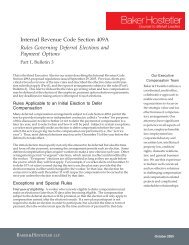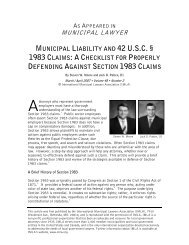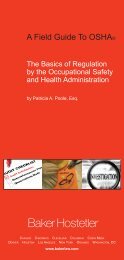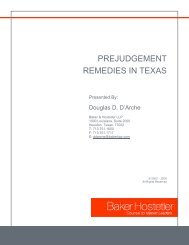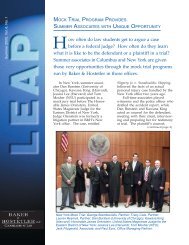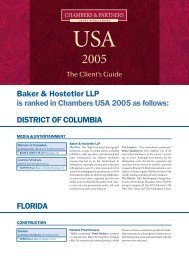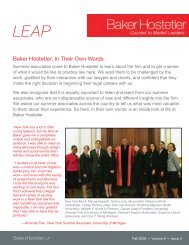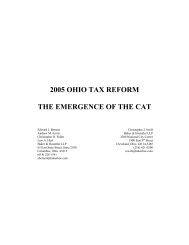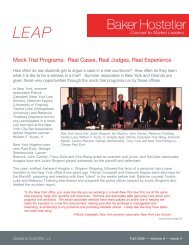The Charity Care Requirement for Hospital Property Tax Exemptions
The Charity Care Requirement for Hospital Property Tax Exemptions
The Charity Care Requirement for Hospital Property Tax Exemptions
You also want an ePaper? Increase the reach of your titles
YUMPU automatically turns print PDFs into web optimized ePapers that Google loves.
THE “CHARITY CARE” REQUIREMENT FOR HOSPITAL PROPERTY<br />
TAX EXEMPTIONS<br />
Edward J. Bernert<br />
Christopher J. Swift<br />
I. Introduction<br />
<strong>Hospital</strong>s throughout the United States are accorded the benefits of a charitable<br />
exemption from various state and local ad valorem property taxes. <strong>The</strong> issue we examine<br />
is the role of a “charity care” requirement, meaning a certain level of “free or discounted<br />
medical care” as a condition to hospitals obtaining charitable exemptions from property<br />
taxes.<br />
A case pending be<strong>for</strong>e the Illinois Supreme Court has attracted considerable<br />
attention because it presents a high profile opportunity <strong>for</strong> that Court to decide whether a<br />
quantified level of charity care is the sine qua non of the charity exemption in Illinois,<br />
Provena Covenant Medical Center v. Illinois Department of Revenue, 384 Ill. App. 3d<br />
734, 894 N.E. 2d 452 (4 th Dist. August 26, 2008), cert. granted, Illinois Supreme Court,<br />
Case No. 107328. <strong>The</strong> appellate court in Provena upheld the Director of the Illinois<br />
Department of Revenue (Director) and denied an exemption in large measure because of<br />
an inadequate demonstration of a level of free care.<br />
A recent decision by the Connecticut Supreme Court--St. Joseph’s Living Center,<br />
Inc. v. Town of Windham, 240 Conn. 695 (March 24, 2009)--while denying the<br />
exemption in that case, nevertheless chose to reject arguments that were successfully<br />
advanced in Provena. <strong>The</strong> Connecticut Supreme Court followed the line of cases from<br />
other states that focus on the overall charitable nature of the health care institution in<br />
contrast to limiting the analysis to specific activities, such as free care <strong>for</strong> the poor, in<br />
gauging qualification <strong>for</strong> exemption.<br />
<strong>The</strong>se two cases, and the decisions of other state supreme courts, provide useful<br />
vehicles to address the role of quantified charity care in the granting to hospitals of<br />
charitable exemptions from property taxes. This issue has been addressed in a number of<br />
decisions but remains a subject of dispute, including in Ohio, in which the issue is being<br />
litigated at the Ohio Board of <strong>Tax</strong> Appeals.<br />
<strong>The</strong> issue is one of state not federal law. State charitable property tax exemptions<br />
are not assured <strong>for</strong> owners that qualify <strong>for</strong> federal income tax exemption under Internal<br />
Revenue Code §501(c)(3). While the state and local property tax exemptions do not<br />
depend on qualification under federal law, the policies under the Internal Revenue Code<br />
likely will impact the manner in which the state exemptions are examined.<br />
A reexamination of the federal income tax exemption of hospitals is under way.<br />
Beginning with the 2008 and 2009 returns, the Federal Form 990, Return of Organization<br />
2



